What 50 years of World Bank partnership meant for us
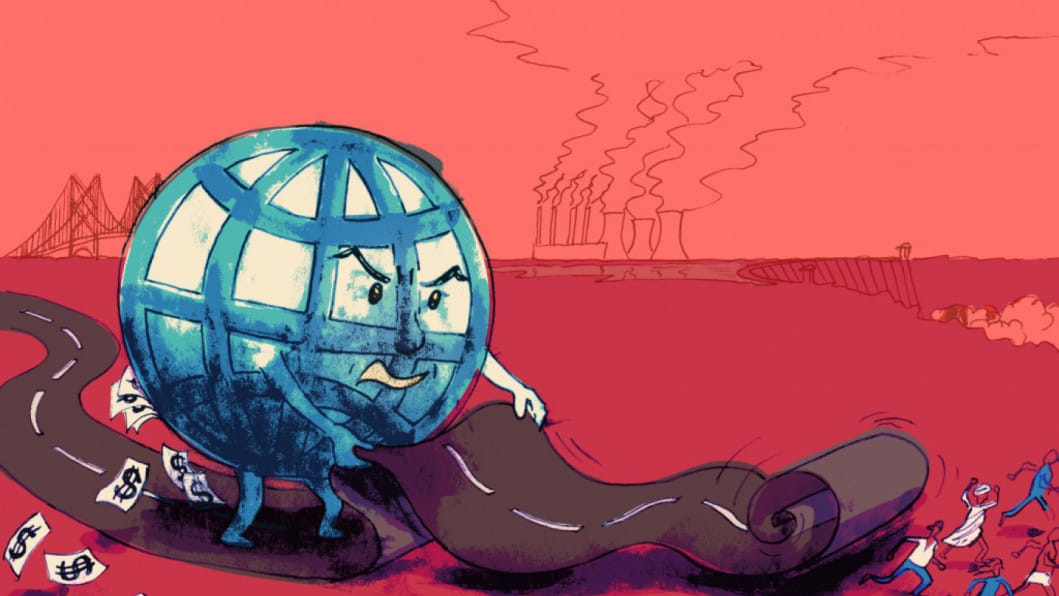
Fifty years of partnership between Bangladesh and the World Bank was celebrated recently. Events were held, praises were sung, and the organisation's managing director of operations visited the country to join celebrations. Now that we have crossed this landmark, perhaps it's time we analysed what this relationship has truly meant for Bangladesh.
The World Bank is generally known as a donor agency and a development partner. It is also an integral part of our foreign loan infrastructure. "Foreign aid" and "donor agencies" are frequently uttered terms, but their usage is actually misleading. If we take a loan from any bank, such as Sonali Bank or Krishi Bank or Agrani Bank, we don't call them donors. Neither do we say that they are providing aid to us. We say that we are doing our work using a loan from these banks. The World Bank functions in a similar way, and the money to pay them back comes from the taxpayers. Therefore, what is known as World Bank's money is actually people's money.
Officially, the World Bank lends money to countries for "development." The International Monetary Fund (IMF) is its closest ally in monitoring the monetary systems of different countries. There is the Asian Development Bank (ADB) for the Asian region, too. They are highly ideologically biased financial partners, so there are similarities between these three agencies in terms of policy outlines, methods of operation and their relationship with different countries. It is not possible to take a loan from one agency when another is hostile.
When a country takes loans from these organisations, the burden of paying off the debt and the incurring interests builds up. But this is not the major component of the whole process. The main agenda of these agencies is to carry out programmes to control and shape policy frameworks or push for structural changes in the countries seeking loans, to make it convenient for big capital. With various conditions and terms, they try to change the direction of the economies to make more space for big business groups.
To this end, these global agencies have been very successful in Bangladesh, accomplishing many things here that they could not in other countries. They have been able to create a strong support base among the elites – politicians, bureaucrats, university teachers, think tank leaders, policymakers, consultants, etc. – to push forward a neoliberal agenda. These agencies talk a lot about transparency and accountability, but they themselves have none of those qualities.
For example, the World Bank gave loans for the "development" of Bangladesh's jute sector, but people never knew the details of those loans – the documents were highly confidential. In approving USD 247 million as "Jute Sector Adjustment Credit" (JSAC), the bank did not ask to diversify the industry, remove corrupt officials, regularise jute purchase system, strengthen innovation and development, and modernise the mills. Rather, their conditions to disburse the loan in instalments included closing the public mills and downsizing others, reducing the number of permanent workers, wage restructuring, etc. What happened then? We saw a large number of jute factories close down since that loan was granted in 1994, including the world famous Adamjee Jute Mill, which was shut down in 2002. The present government closed down the remaining jute mills in 2020. The huge potential of this environment-friendly industry was sacrificed.
We hear the organisation works as a "development partner in the energy sector" by giving us aid and loans. But, in reality, it works to hand over public resources and services to profit-making private entities. Since the early 1980s, it has been pushing for privatisation and commercialisation of this sector. The first elaborate report by the World Bank on Bangladesh's energy sector, released in 1982, assessed that the size of the country's gas reserves was 10 trillion cubic feet and asked to "secure the participation of foreign oil companies in this area." It also argued that since the supply of gas is "likely to remain well in excess of Bangladesh's expected internal needs," exporting gas was the best option. Later, during the late 90s, there was huge pressure from the bank, company, consultants and embassies to export gas through a pipeline to India.
These agencies also tried to push for open pit mining in Phulbari to export coal by destroying three crop lands, water resources, and evicting about a million people to give business to a fraudulent British company. All those would have happened and made the situation worse had the people not put up a resistance.
These organisations don't like the growth of national capability; they consider it an obstacle to the free market process. Instead of developing our national capacity to explore and produce natural gas in still-unexplored areas, and also developing institutional capabilities to mainstream renewable energy, the government opted for highly expensive, import-oriented "solutions": coal, nuclear power and LNG. This whole policy structure that came from their energy sector policy guidelines gave big profits to some local and foreign businesses, but put our whole industry and businesses in a vulnerable position and the country in a severe energy and financial crisis.
The same World Bank took another initiative in the late 1980s to "help" Bangladesh after the massive floods of 1987-88, and finalised a megaproject titled "Flood Action Plan" in 1990. The plan was all about the construction of 4.5-7.5-metre high and nearly 4,000km long embankments on both sides of three major rivers in the country, with the initial loan of USD 5-10 billion. This was a disastrous plan for the country's river system which people also had to resist. But they have still seeped into the government policies under different names and projects.
Because of various "aided projects" by these agencies, our railway or waterways could not be developed, and the road-based transportation system became dominant. That benefitted private car business and construction contractors, but increased pollution, accidents and costs for the public.
Drinking water has also become a costly commodity as an outcome of their projects. Dhaka Wasa, for example, has increased its water tariff a total of 15 times since 2009. Dhaka Wasa has undertaken many projects with foreign loans; these projects brought good fortune for many people including the officials, consultants, contractors and suppliers, but could not ensure safe drinking water for the people.
There are allegations that these agencies, not only in Bangladesh but worldwide, have an incentive programme for various key people as a form of bribes, and they prefer corrupt partners as it is convenient for them to sell their agenda, as described by John Perkins in his book Confessions of an Economic Hit Man, or as narrated by Graham Hancock in his book Lords of Poverty.
From the very beginning, Bangladesh needed to work on three things: national capability, universal public education, and universal healthcare. These three could never flourish because of the dominant development model. Instead, in the last 50 years, a superrich class was consolidated, inequality deepened, and environmental disasters made people's lives miserable. This is the result of the policy structures formulated and/or supported by these agencies.
The World Bank et al like to claim that all of these responsibilities fall on the governments. Yes, governments must bear the primary responsibility for all anti-people, anti-environment policies, looting and wastage, but these agencies must also be brought under scrutiny, because they play the key role behind all these. Therefore, people in many countries, including the US and Europe, organised people's tribunals to make them accountable; we also did so in 2007. Unless we make these organisations along with their local partners accountable, we cannot claim true freedom or create a development policy that will serve all of our people.
Transcribed and translated by Anupam Debashis Roy.
Anu Muhammad is a professor of economics at Jahangirnagar University.
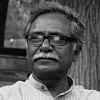
 For all latest news, follow The Daily Star's Google News channel.
For all latest news, follow The Daily Star's Google News channel. 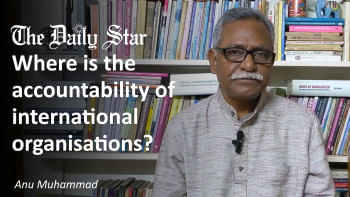
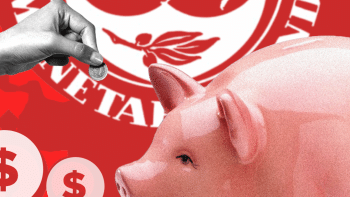
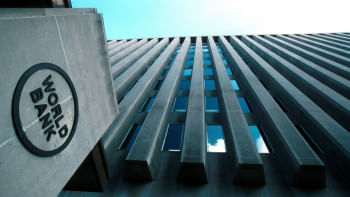



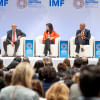





Comments